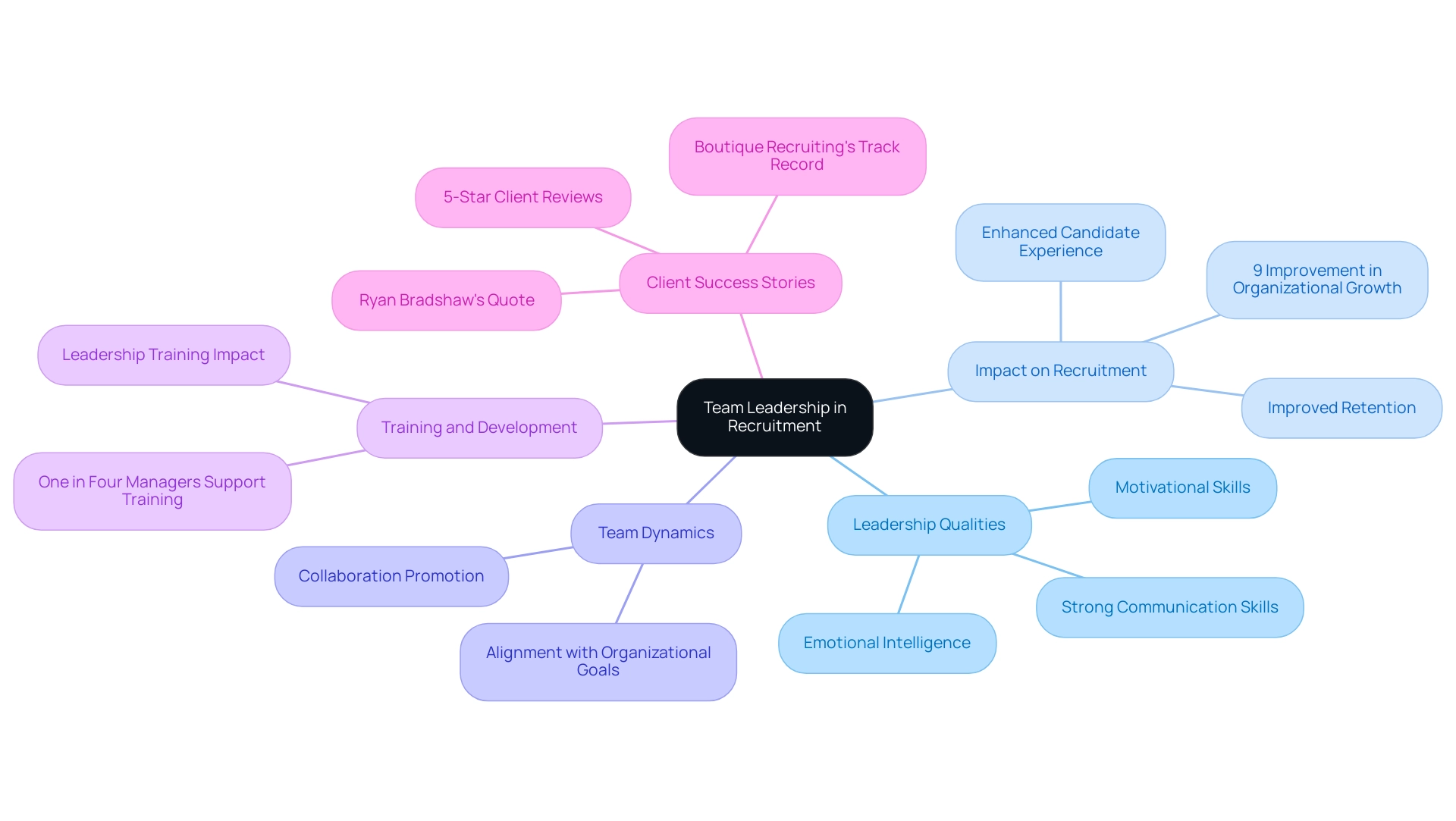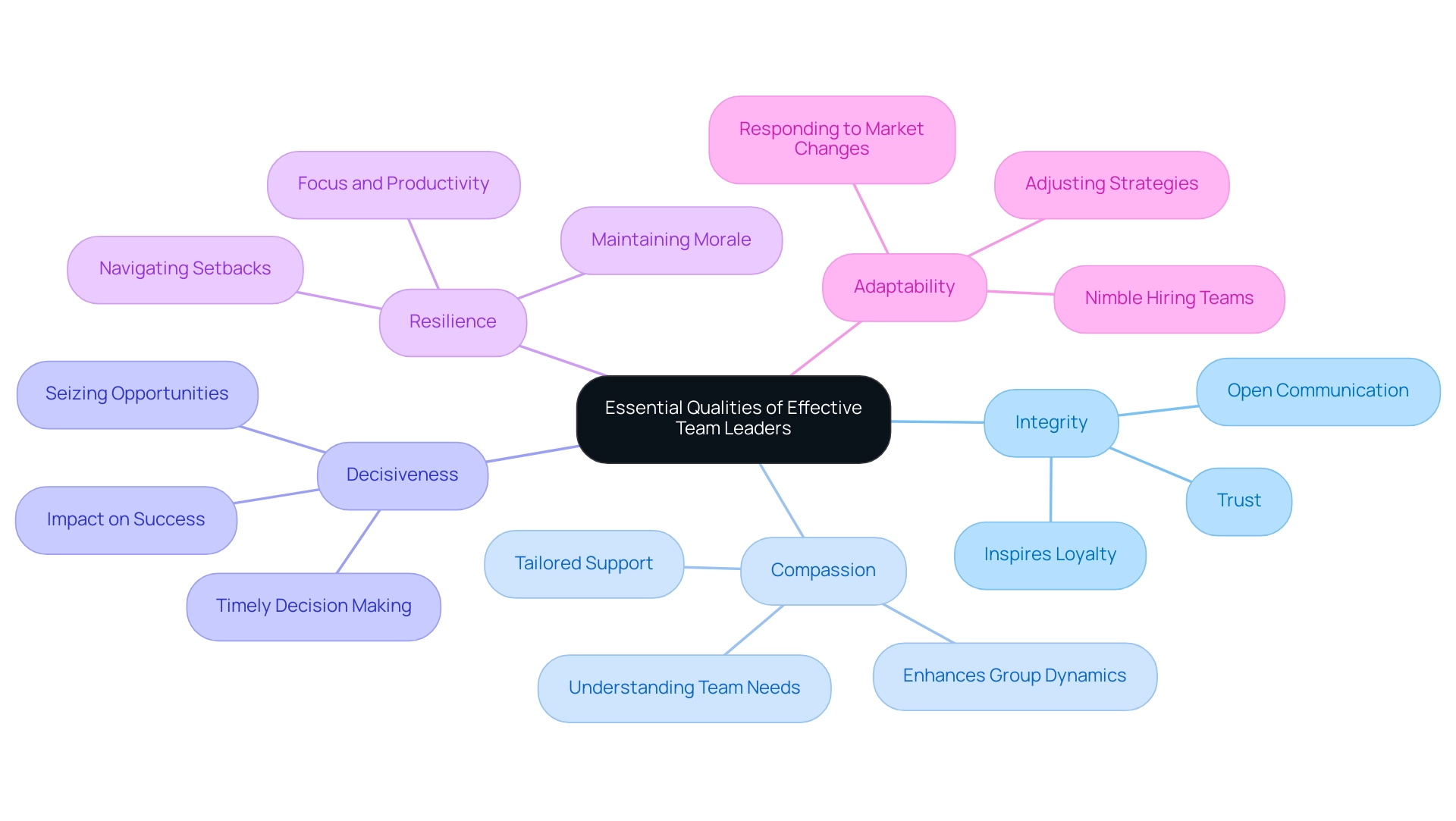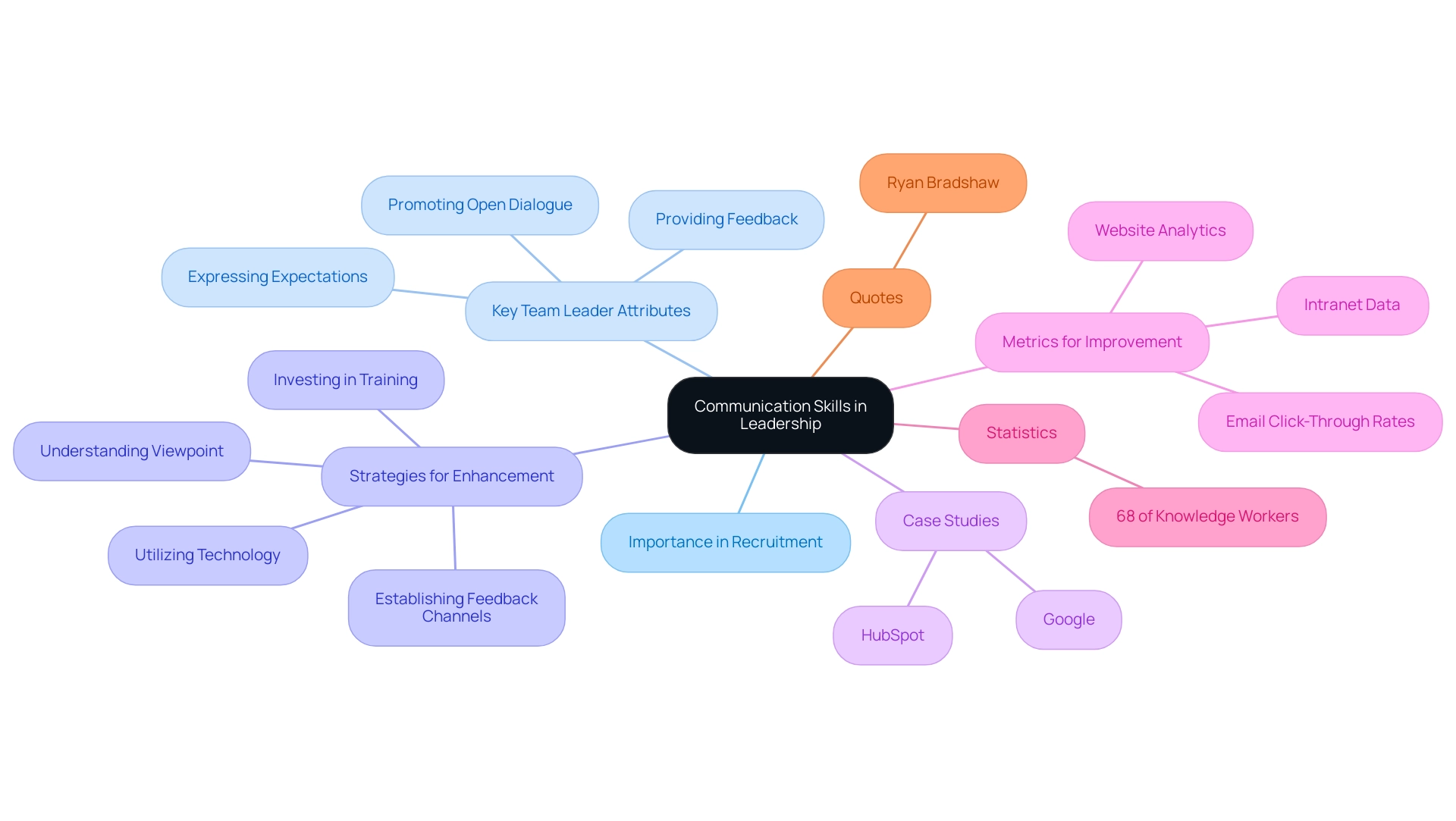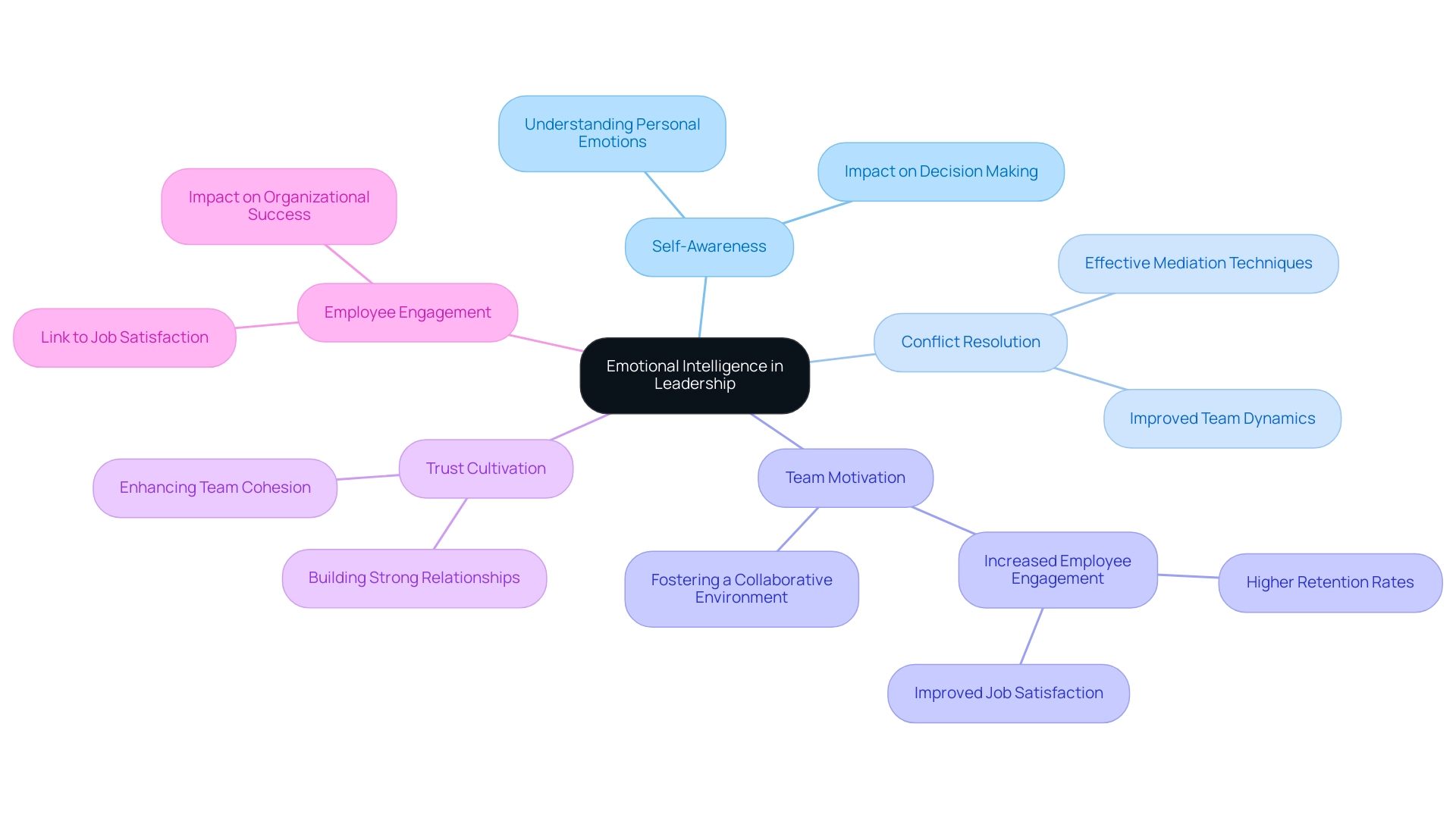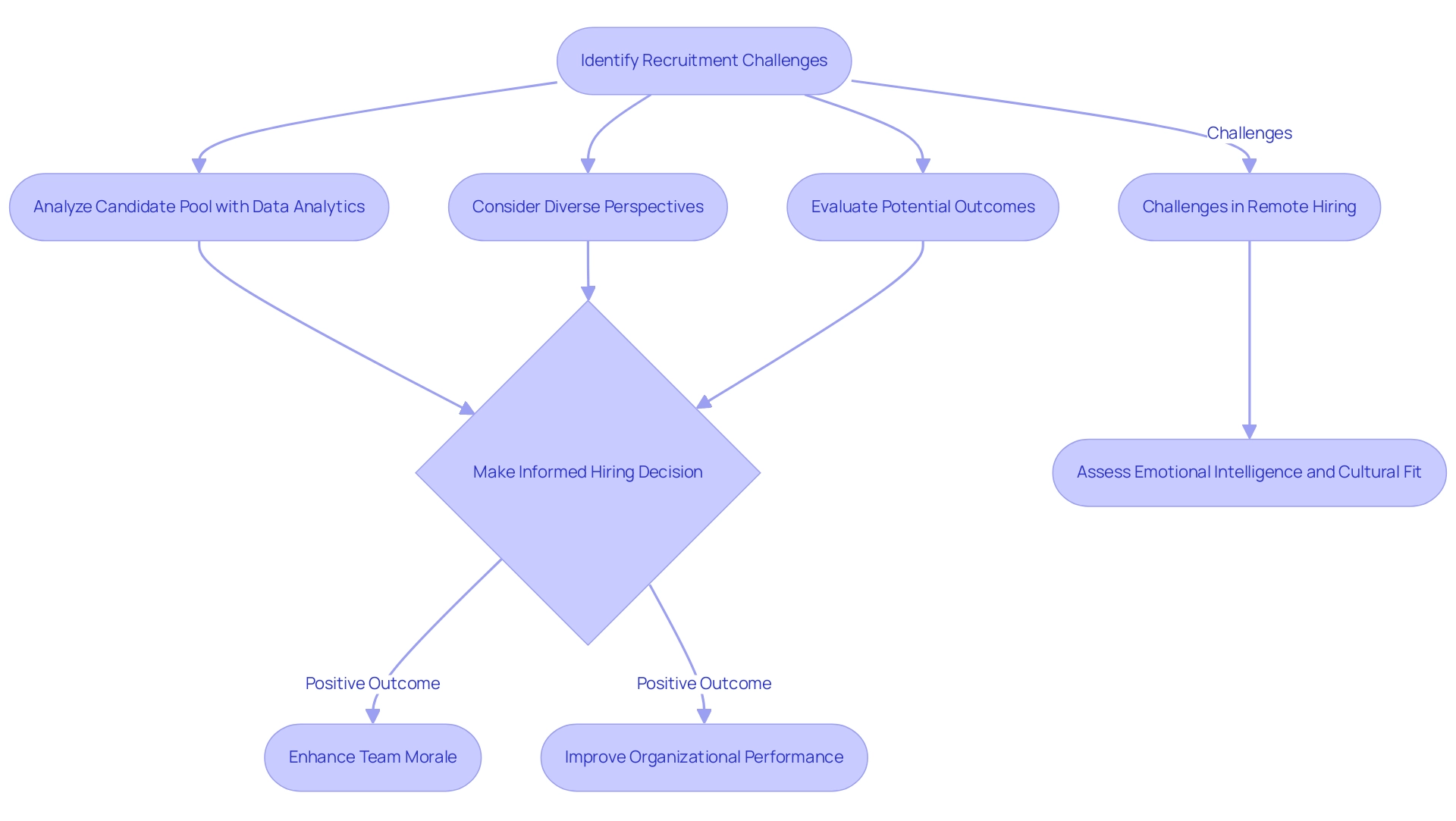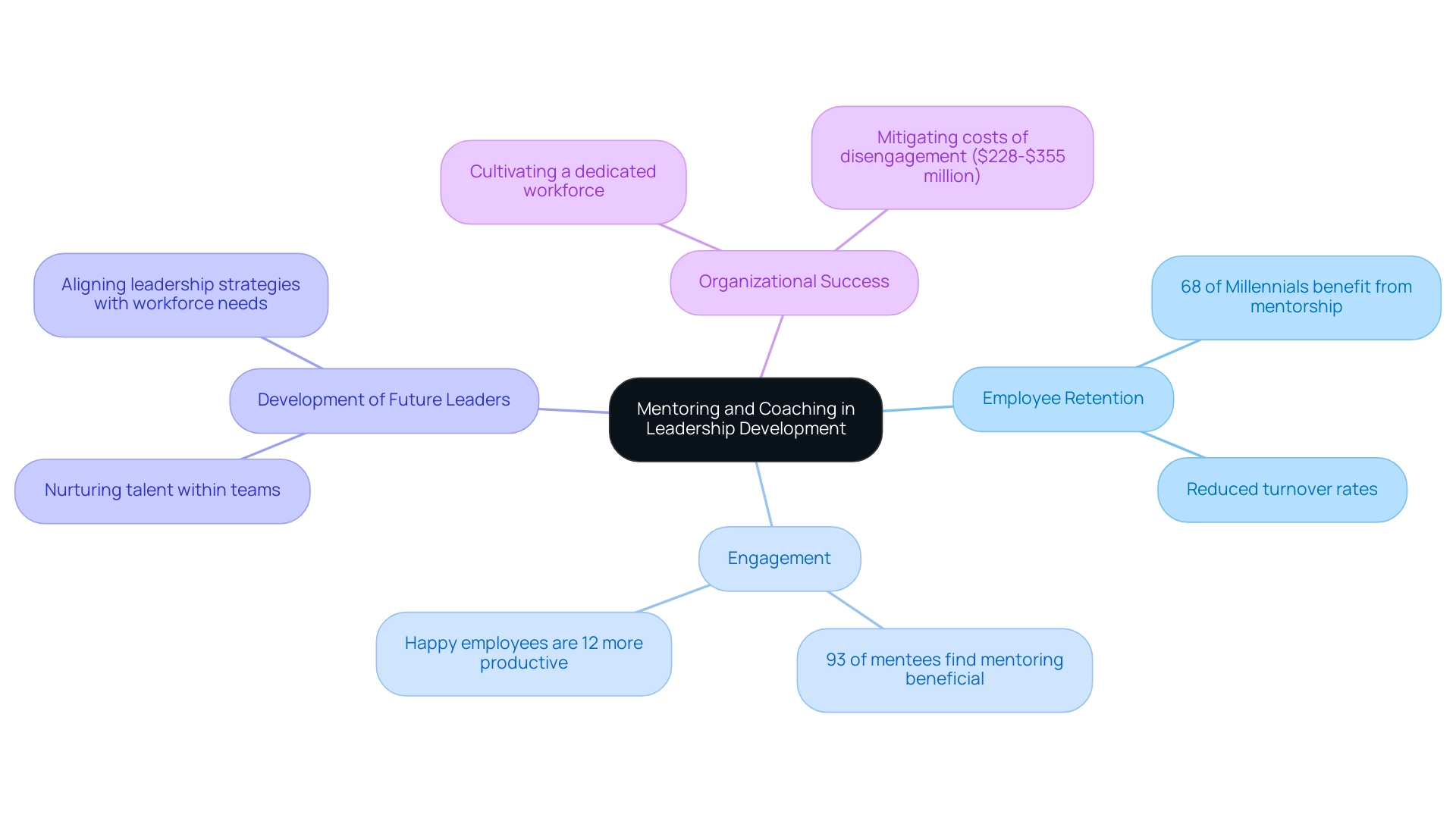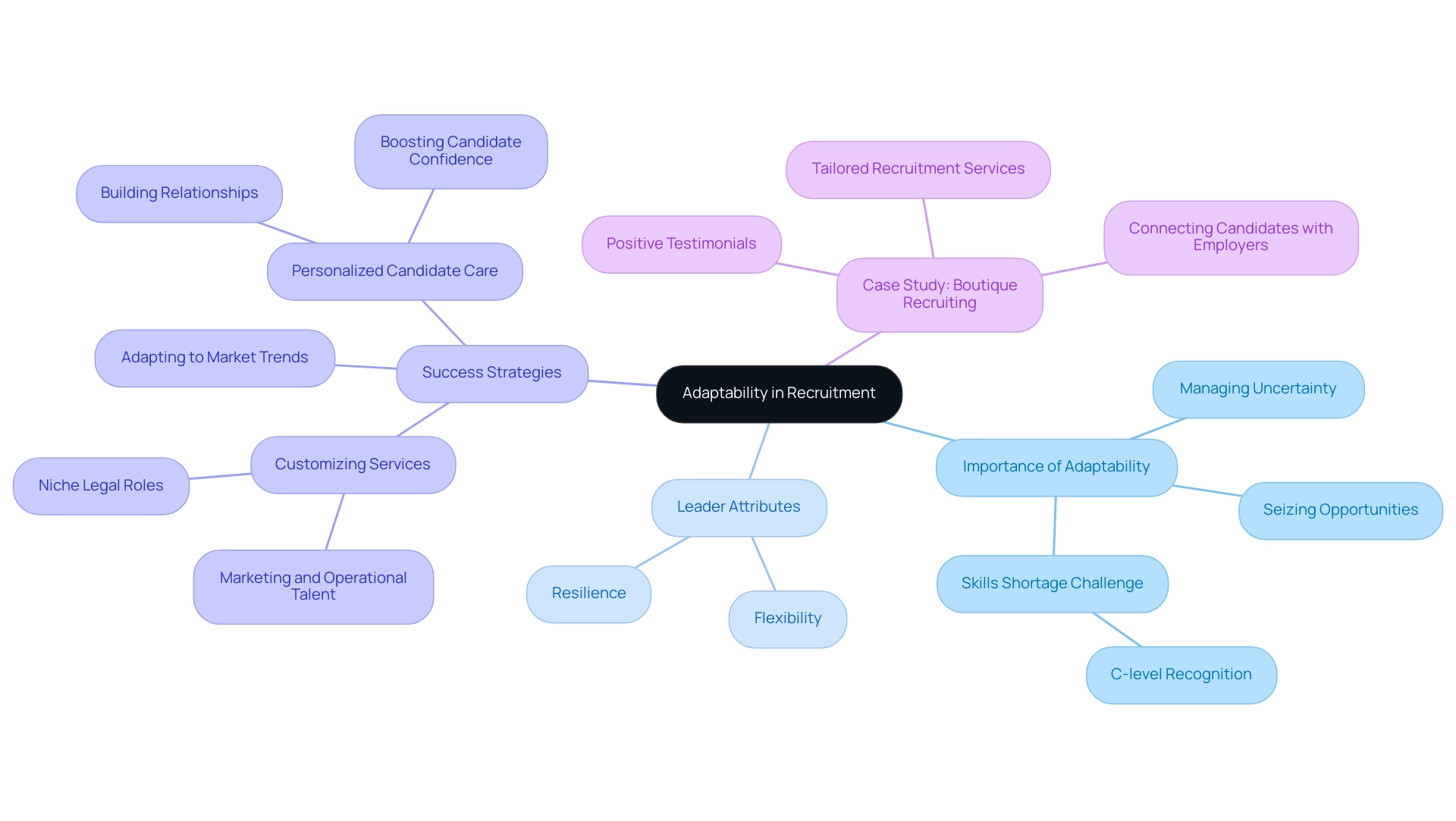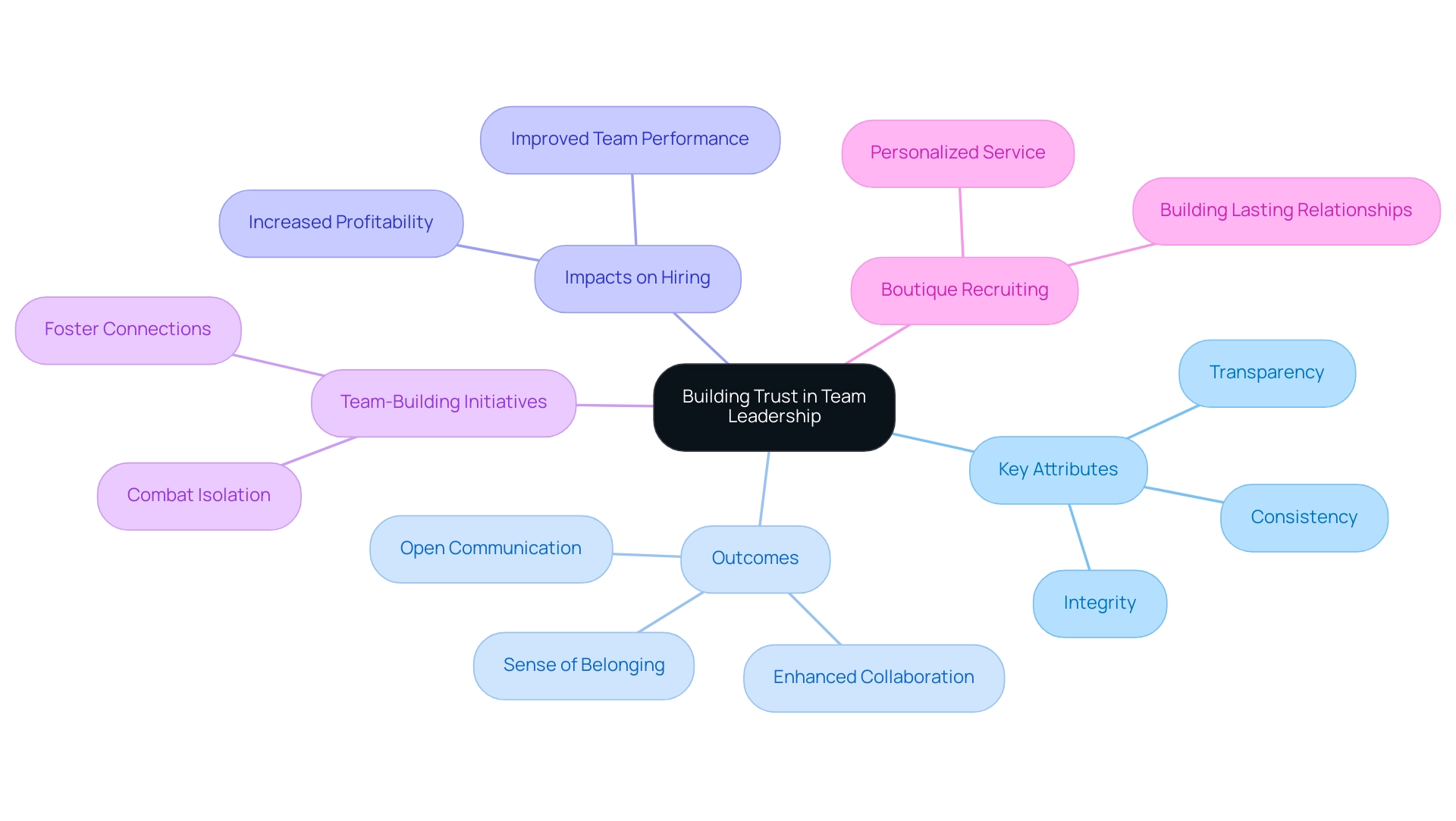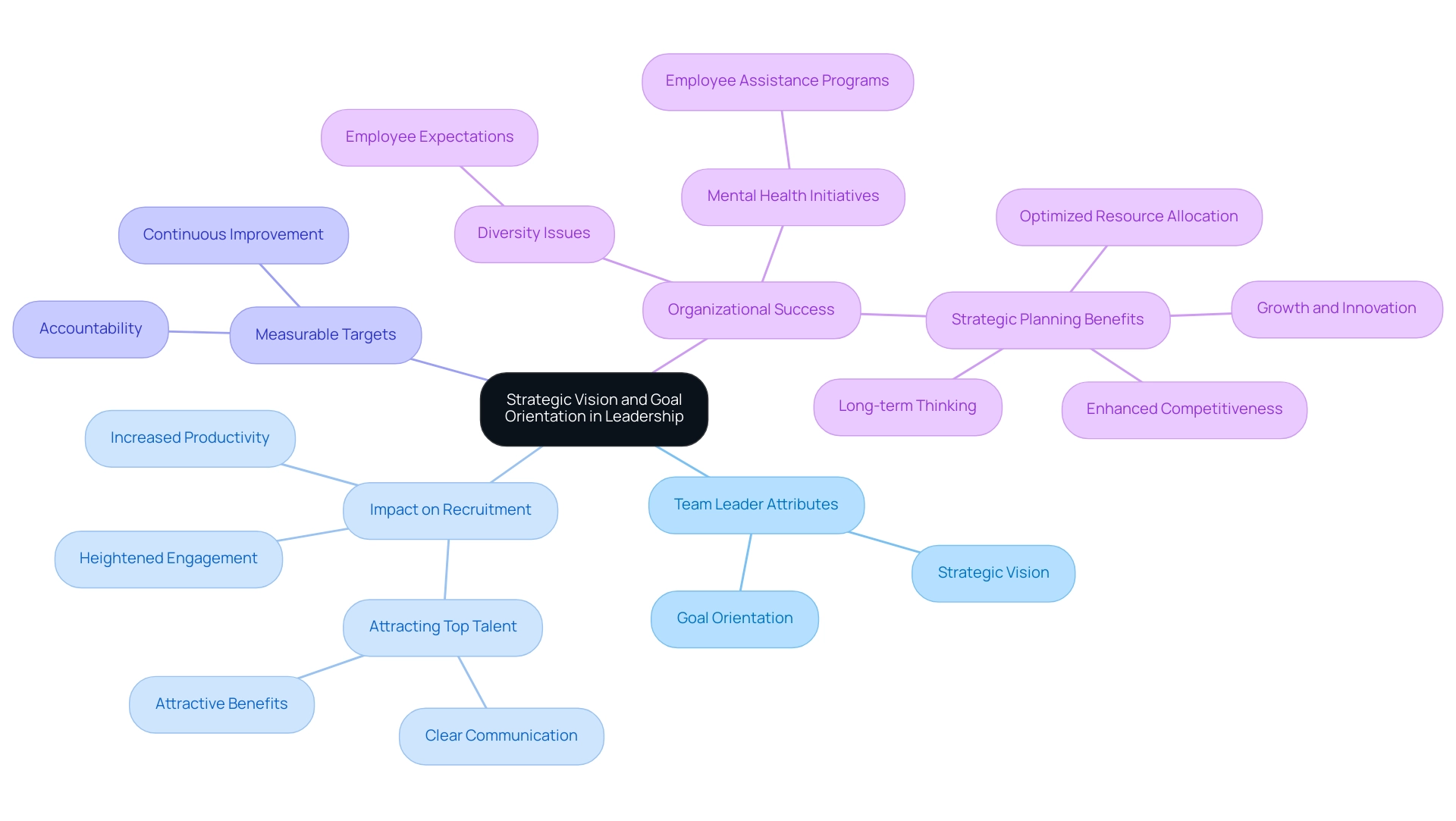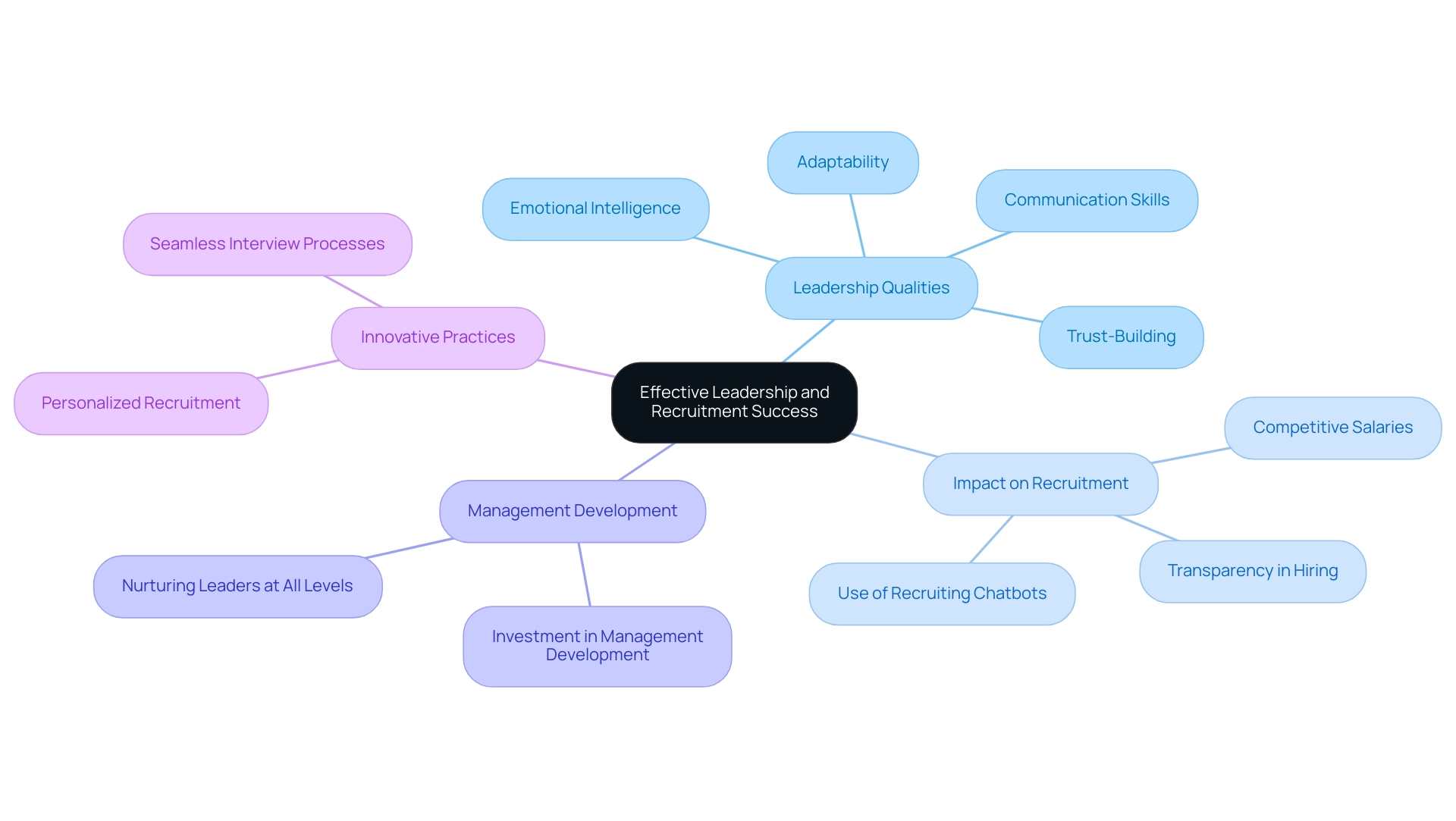Overview
Effective leaders in recruitment embody key attributes such as integrity, emotional intelligence, adaptability, and strong communication skills. These qualities are essential for achieving hiring success and fostering high-performing teams. By illustrating how these attributes enhance team dynamics and improve candidate experiences, the article highlights their role in leading to better hiring outcomes.
Successful practices at Boutique Recruiting demonstrate a tailored approach that meets diverse client needs, reinforcing the importance of personalized recruitment strategies in the financial sector.
Key Highlights:
- Effective leadership in recruitment is crucial for achieving hiring goals and motivating teams.
- Leaders must understand team dynamics and align objectives with organizational aims.
- Boutique Recruiting exemplifies tailored recruitment solutions, enhancing client satisfaction and talent acquisition.
- Key leader attributes include integrity, compassion, decisiveness, resilience, and adaptability, fostering a positive hiring environment.
- Communication skills are vital, promoting transparency and collaboration among recruitment teams.
- Emotional intelligence enhances team dynamics, employee retention, and job satisfaction.
- Strategic vision and goal orientation improve recruitment outcomes and align team efforts with organizational objectives.
- Decision-making skills are essential for navigating challenges and improving hiring processes.
- Mentoring and coaching develop future leaders and enhance employee engagement and retention.
- Building trust through transparency and consistency fosters collaboration and improves hiring success.
Introduction
In the competitive realm of recruitment, effective team leadership stands out as a crucial factor in attracting and retaining top talent. As organizations navigate the complexities of a rapidly evolving job market, leaders must not only guide their teams but also inspire them to excel in their roles.
What qualities define successful recruitment leaders? This article delves into the essential attributes, highlighting the significance of:
- Emotional intelligence
- Communication skills
- Adaptability
These qualities are vital in fostering a collaborative environment. Insights drawn from industry leaders like Boutique Recruiting reveal that strong leadership not only enhances recruitment outcomes but also shapes a positive organizational culture.
As the landscape continues to shift, understanding the pivotal role of leadership in recruitment success is more important than ever. Are you ready to elevate your recruitment strategy through effective leadership?
Understanding Team Leadership in Recruitment
The guidance provided by those in charge during hiring involves the capacity to efficiently direct and impact their groups toward accomplishing hiring goals. Successful group leaders not only manage the hiring process but also motivate their members to excel in recognizing and attracting top talent. This necessitates a profound comprehension of team dynamics, promoting collaboration, and aligning team objectives with wider organizational aims.
In 2025, the hiring environment is becoming increasingly competitive, making strong leadership crucial for managing challenges and preserving team focus and motivation. Boutique Recruiting exemplifies this with its custom hiring solutions tailored to the unique needs of various industries, including technical and HR roles such as Chief Technology Officers, Engineers, and HR Directors. Their approach has proven effective, as highlighted by numerous 5-star reviews from clients who appreciate the personalized service and exceptional talent acquisition.
For instance, clients have noted how Boutique Recruiting takes the time to understand their specific requirements, leading to a quick and efficient hiring process that consistently delivers high-quality candidates. Research indicates that innovative approaches to traditional recruitment techniques have led to a 9% improvement in organizational growth, profit, productivity, and transformation. Additionally, a notable 63% of C-suite-level employees indicate finding meaning or purpose in their roles, highlighting the significance of guidance in enhancing job satisfaction and engagement across all levels.
Case studies reveal that one in four managers believes that training for supervisors positively influences business outcomes, including employee retention and engagement. This acknowledgment emphasizes the essential role of management development in fostering a productive and engaged workforce. Successful recruitment groups, such as those at Boutique Recruiting, exemplify this principle, demonstrating how effective leadership can lead to improved recruitment outcomes and a stronger organizational culture.
Effective leaders in recruitment display team leader attributes such as strong communication skills, emotional intelligence, and the ability to motivate and inspire members. These qualities not only enhance group performance but also contribute to a more positive candidate experience, ultimately leading to better hiring decisions. As noted by satisfied clients, Boutique Recruiting’s staff is dedicated to understanding the intricacies of their clients’ needs, ensuring that they present candidates who are not only qualified but also a cultural fit.
As the hiring environment continues to evolve, the significance of guidance in achieving hiring success cannot be overstated. This focus is crucial for organizations seeking to attract and retain top talent. Boutique Recruiting’s strong history of success further highlights the importance of effective leadership in achieving hiring objectives. Are you ready to enhance your recruitment strategy? Reach out today for a consultation.
Essential Qualities of Effective Team Leaders
Successful leaders in hiring at Boutique Recruiting embody team leader attributes that encompass a range of crucial traits fostering achievement in their roles. Integrity stands out as essential, nurturing trust within the group and establishing a foundation for open communication. Leaders who demonstrate integrity are more likely to inspire loyalty and dedication from their team members, a vital aspect in a competitive hiring environment.
This is particularly significant given that only 18% of employees feel their supervisors represent diverse backgrounds, while merely 21% believe their organizations recruit from diverse candidate pools. Leaders who prioritize integrity play a pivotal role in bridging this gap, promoting a more varied and equitable hiring process.
Compassion emerges as another fundamental quality, enabling leaders to understand and respond to the diverse needs of their teams, including roles such as CFOs and Financial Managers. This trait not only enhances group dynamics but also boosts overall performance. Leaders who are attuned to their members’ feelings and challenges can provide tailored support and guidance. The importance of team leader attributes, including integrity and empathy, in hiring management cannot be overstated; these qualities foster a more inclusive workplace and align with the necessity for transparency and authenticity in the hiring process.
Decisiveness is critical in the fast-paced realm of hiring. Leaders must make timely decisions to seize opportunities and effectively address challenges. This ability to act swiftly can have a profound impact on a firm’s success, with studies indicating that effective group management can lead to profit increases of up to 29%. This statistic underscores the significance of strong leadership in driving organizational success.
Resilience also plays a crucial role, as hiring often involves navigating setbacks and challenges. Individuals who exhibit resilience can maintain group morale and motivation, ensuring that their teams remain focused and productive even in difficult situations. Flexibility is another vital trait of effective leaders, enabling them to adjust strategies in response to evolving market conditions. This adaptability ensures that hiring teams can remain nimble and responsive, which is essential in today’s ever-changing job market.
In summary, the vital team leader attributes of effective figures in hiring at Boutique Recruiting—integrity, empathy, decisiveness, resilience, and adaptability—are indispensable for creating successful teams. By embodying these traits, hiring managers can cultivate an environment that not only attracts top talent but also nurtures and retains it, ultimately driving organizational success. As Sanna Marin, the Prime Minister of Finland, emphasized, representation in leadership roles is crucial, and capable leaders should strive to reflect the diversity of their teams while embracing openness and authenticity in their hiring practices.
The Role of Communication Skills in Leadership
Communication skills are essential for effective leadership in recruitment, embodying critical team leader attributes that form the backbone of successful group dynamics—especially in high-demand finance and technology roles such as CFOs, Financial Managers, and Chief Technology Officers. Key team leader attributes encompass the ability to express expectations clearly, provide constructive feedback, and promote open dialogue among group members. This strategy not only cultivates a culture of transparency and trust but also empowers team members to freely express their ideas and concerns.
Research indicates that 68% of knowledge workers believe generative AI can enhance workplace communication, underscoring the growing importance of leveraging technology in hiring environments. Leaders who prioritize effective communication exhibit vital team leader attributes that align their team’s efforts with organizational objectives, ensuring all members work towards shared goals. This alignment is particularly critical in recruitment, where collaboration and coordination are essential for attracting top talent in finance and technology sectors.
To enhance communication, leaders should demonstrate team leader attributes by:
- Understanding the speaker’s viewpoint
- Establishing feedback channels
- Investing in training
- Utilizing technology
Case studies from industry leaders like Google and HubSpot showcase best practices in communication. These companies have successfully adopted diverse communication platforms to streamline internal interactions, resulting in improved clarity, timely support, and personalized engagement.
Such strategies not only bolster group performance but also emphasize important team leader attributes in a more unified hiring process.
Moreover, analyzing staff interactions through website analytics, email click-through rates, and intranet data can pinpoint areas for improvement in communication. By focusing on these metrics, hiring leaders can refine their communication strategies—key team leader attributes that ultimately enhance group performance and improve hiring outcomes. As Ryan Bradshaw aptly states, “Have you ever wondered how long employers look at your resume/cover letter? Here’s a hint: Not very long.” This underscores the urgent need for clear and effective communication in hiring processes. In 2025, the importance of communication skills in hiring management cannot be overstated, as these team leader attributes are crucial for fostering group success and achieving organizational objectives.
Emotional Intelligence: A Cornerstone of Leadership
Emotional intelligence (EI) serves as a fundamental pillar of effective leadership, showcasing vital team leader attributes within the recruitment sector. Leaders endowed with high EI possess the unique ability to recognize and manage their own emotions while also attuning to the feelings of their group members. This dual awareness enables them to navigate interpersonal relationships with finesse, cultivating a supportive and collaborative group environment.
Such individuals excel in conflict resolution, group motivation, and the establishment of a culture rooted in trust and respect.
In the field of hiring, where team dynamics play a pivotal role in overall performance, team leader attributes like emotional intelligence become indispensable for forging strong, cohesive teams. Research indicates that organizations led by leaders who possess key team leader attributes related to emotional intelligence are four times more likely to retain highly skilled employees, underscoring the significance of EI in leadership effectiveness. Furthermore, expert insights reveal that emotional intelligence is closely linked to higher job engagement and satisfaction, which are crucial for maintaining a motivated workforce.
As noted by writer Saisuman Revankar, “Emotional intelligence is linked to higher job engagement and satisfaction.”
Boutique Recruiting exemplifies this principle through its personalized hiring solutions, including custom searches tailored to the unique needs of various industries and locations. Clients have praised the group for their ability to understand the specific requirements of their organizations, leading to successful placements that align with both skill set and company culture. One client noted, “They truly go the extra mile to understand our company and the needs of the various managers within our organization to learn how we operate,” showcasing how emotional intelligence fosters a deeper connection between recruiters and clients.
Case studies, like ‘Measuring the Impact of Emotional Intelligence Training,’ have shown the tangible advantages of emotional intelligence training within hiring groups. Organizations that implemented such training observed marked improvements in employee engagement, group productivity, and conflict resolution capabilities. These improvements not only strengthen group dynamics but also aid in a more efficient hiring process, ultimately resulting in better candidate placements and organizational success.
As we progress into 2025, the role of emotional intelligence in leadership during hiring continues to gain prominence. Leaders who prioritize EI demonstrate important team leader attributes that help foster an environment where team members feel valued and understood, thereby enhancing overall team performance and satisfaction. In a competitive job market, the ability to lead with emotional intelligence is not just an asset; it is a necessity for achieving sustainable success in hiring.
Boutique Recruiting’s impressive track record of success, characterized by numerous satisfied clients and candidates, further emphasizes the importance of EI in effective leadership in hiring.
Decision-Making Skills: Navigating Challenges Effectively
Decision-making abilities are crucial for individuals in hiring, particularly as they navigate the complexities of a rapidly evolving job market. In 2025, recruitment professionals must be adept at making swift, informed choices that can significantly influence their organization’s talent acquisition success. Effective leaders exemplify key team leader attributes by leveraging data analytics to assess candidate pools, consider diverse perspectives, and evaluate potential outcomes before arriving at decisions.
This analytical approach not only enhances the quality of their choices but also fosters trust and confidence among team members. Involving group members in the decision-making process cultivates a sense of ownership and accountability, which can lead to heightened morale and improved performance. Research indicates that organizations with highly engaged team members are more profitable, underscoring the importance of collaborative decision-making in recruitment.
As the war for talent intensifies, hiring managers must ensure that the interview process is handled seamlessly. Candidates today are not merely seeking any job; they are actively looking for the right fit with the right company. They assess potential employers for red flags during interviews, such as:
- A lack of clarity about job roles
- Negative comments about previous employees
- Disorganization during the interview process
This makes it essential for individuals in authority to present their organizations positively.
The challenges of remote hiring further complicate the decision-making landscape, as managers must assess candidates’ emotional intelligence and cultural fit—elements that are often harder to gauge in virtual settings. A recent study emphasized that 19% of Australian business executives reported challenges in addressing unsuccessful candidates, illustrating the need for effective decision-making strategies in hiring. Moreover, the hiring sector is currently facing challenges, as evidenced by a revenue decline among major staffing firms, which accelerated from -0.11% quarter-over-quarter in Q4 2022 to -3.36% in Q3 2023. This context highlights the urgency for hiring managers to refine their decision-making abilities in response to these industry challenges.
Furthermore, case studies reveal that employees granted work autonomy are 2.3 times more likely to excel, underscoring the essential role of flexible work arrangements in improving performance and retention. As hiring managers enhance their decision-making abilities and navigate the complexities of attracting top talent, they can better position their organizations for success in this competitive landscape by focusing on essential team leader attributes.
Mentoring and Coaching: Cultivating Future Leaders
Mentoring and coaching are pivotal elements in cultivating effective leadership within the hiring sector. Individuals who devote time to guide their group members play an essential role in forming the next generation of leaders. This process entails offering guidance, sharing valuable insights, and delivering constructive feedback aimed at enhancing individual skills and competencies.
The influence of effective mentoring reaches beyond personal growth; it cultivates a culture of continuous learning and development, which is essential in the dynamic hiring landscape. Research indicates that 68% of millennials who remain with their organizations for five or more years have benefited from mentorship, underscoring the importance of these relationships in employee retention and satisfaction. Furthermore, 93% of mentees report that their mentoring experiences were beneficial, highlighting the positive outcomes of such initiatives.
This indicates that organizations that prioritize mentorship can significantly boost employee loyalty and decrease turnover.
By fostering talent within their teams, managers not only improve overall team performance but also contribute significantly to the long-term success of their organizations. As the workforce increasingly comprises Millennials and Gen Z by 2025, the demand for effective mentorship programs will only grow. Companies that prioritize mentorship are likely to see reduced turnover rates and improved employee engagement, as disengaged employees can cost median-sized S&P companies between $228 and $355 million annually in lost productivity.
This connection demonstrates how mentorship initiatives can reduce disengagement and cultivate a more dedicated workforce.
Effective mentoring programs in hiring not only nurture future influencers but also establish a more involved and efficient workforce, ultimately propelling organizational success. The case study titled ‘Mentorship Trends Among Millennials and Gen Z‘ reveals that many younger employees value mentorship yet report a lack of such opportunities, indicating a critical area for organizations to address. By implementing robust mentoring initiatives, companies can align their leadership development strategies with the evolving needs of their workforce, ensuring they cultivate effective individuals who possess the team leader attributes necessary for success in hiring.
Adaptability: Thriving in a Dynamic Recruitment Environment
Adaptability stands as a cornerstone attribute for team leaders navigating the dynamic landscape of recruitment. In an environment where candidate expectations and market dynamics shift rapidly, the ability to pivot strategies is not merely advantageous but essential for sustained success. Leaders who prioritize adaptability embody key attributes that enable them to effectively manage uncertainty and guide their teams through transitions with confidence.
This flexibility cultivates resilience within teams, allowing organizations to seize emerging opportunities as they arise.
As we look toward 2025, the hiring environment is characterized by a significant skills deficit, recognized by C-suite executives as one of the top three obstacles to organizational transformation. This reality underscores the critical importance of team leader attributes in attracting and retaining top talent. Leaders who demonstrate the ability to swiftly adjust their approaches to meet the demands of a competitive job market are better positioned to ensure their organizations remain agile and responsive.
According to Tom Jendriks, a hiring expert, top job candidates typically remain available for only about 10 days on the job market. This statistic highlights the urgency for leaders to adapt quickly to secure high-quality talent. For instance, Boutique Recruiting exemplifies how adaptability can lead to hiring success. By customizing their services to meet the unique requirements of clients—such as offering specialized hiring solutions for niche legal roles and sourcing high-quality marketing and operational talent—they have established themselves as a reliable partner in the hiring process.
Amanda, a dedicated recruiter at Boutique Recruiting, is committed to providing personalized candidate care, ensuring that each placement is made efficiently while fostering strong relationships with candidates. This approach not only calms candidates but also boosts their confidence before interviews, leading to successful outcomes.
Moreover, Boutique Recruiting’s adaptability is evident in their capacity to modify hiring strategies based on market trends and client feedback, ensuring they attract the right candidates swiftly. Their commitment to personalized service has resulted in a strong track record of effective placements, as evidenced by positive testimonials from both employers and candidates. One client remarked, “Boutique Recruiting is the best! I applied for a job via their page on LinkedIn, and Irene Hernandez from their office called me immediately to discuss the role. She set up an interview ASAP and was such a great support during the whole process.”
As the hiring landscape continues to evolve, team leader attributes that embrace adaptability will be essential for thriving and steering organizations toward greater success in attracting the right candidates.
Building Trust: The Foundation of Effective Team Leadership
Establishing trust is crucial for effective leadership in recruitment. Leaders who showcase team leader attributes such as transparency, integrity, and consistency cultivate an environment where members feel secure in sharing their ideas and concerns. This trust not only enhances collaboration but also fosters open communication and a sense of belonging among group members.
Studies demonstrate that a highly engaged workforce can achieve 21% greater profitability, underscoring the importance of trust in driving hiring success. When trust is established, groups are more likely to collaborate effectively towards common goals, leading to improved hiring results. Consider this: a case study revealed that 20% of employees reported feelings of loneliness in the workplace. Such feelings can be mitigated through team-building activities that foster connections, particularly among remote workers. These initiatives not only alleviate isolation but also contribute to a more engaged workforce.
Leaders who prioritize trust-building strategies lay a strong foundation for group success, ultimately benefiting the organization as a whole. Effective hiring leadership hinges on the ability to cultivate trust, directly impacting team performance and demonstrating the key team leader attributes that enhance the overall effectiveness of hiring efforts. By applying team leader attributes focused on trust-building strategies, those in charge can improve collaboration and achieve better outcomes in their hiring processes.
Boutique Recruiting exemplifies this approach, concentrating on building lasting relationships and providing personalized service, as evidenced by numerous 5-star reviews from clients and candidates. Their commitment to understanding the unique needs of each organization and candidate, as demonstrated by Amanda’s dedication to personalized candidate care, distinguishes them in the industry and reinforces their impressive track record of success. Amanda, a graduate of Northern Kentucky University with a Bachelor’s Degree in Human Resources, specializes in pairing professional companies with elite candidates across various industries, including technical and HR roles.
Her ability to foster connections and comprehend the specific requirements of both clients and candidates enhances the hiring process, ensuring high-quality placements.
Strategic Vision and Goal Orientation in Leadership
Strategic vision and goal orientation are indispensable attributes for team leaders aiming for effective recruitment, particularly in specialized fields such as accounting and marketing. Leaders who embody these attributes and articulate a clear vision can effectively communicate their group’s direction and purpose, ensuring that every member grasps their role in achieving organizational objectives. This clarity not only fosters alignment but also inspires team members to collaborate towards shared goals.
Individuals possessing team leader attributes excel at establishing measurable targets that steer group efforts and facilitate performance monitoring. By setting specific benchmarks, they create a framework for accountability and continuous improvement. Research indicates that organizations with a strategic vision exhibit essential team leader attributes, rendering them 40% more likely to fulfill their hiring objectives, thus underscoring the importance of this leadership trait in a competitive landscape.
Moreover, the impact of goal orientation on team leader attributes in hiring success is significant. Teams led by individuals with effective team leader attributes demonstrate heightened engagement and productivity, driven by clear objectives. A case study on candidate attraction strategies revealed that companies prioritizing transparent communication and appealing benefits significantly surpassed their competitors in attracting top talent.
This underscores how team leader attributes, including strategic vision and goal orientation, not only bolster group performance but also enhance overall recruitment success.
As Boutique Recruiting specializes in sourcing high-quality talent for accounting and marketing roles, the integration of strategic vision and goal orientation becomes even more critical. Leaders in these sectors must align their strategic goals with the evolving expectations of the workforce, especially as 60% of employees deem it essential for leaders to publicly address diversity issues. By cultivating an environment that prioritizes mental health and well-being—an initiative championed by 40% of organizations—leaders can further amplify their teams’ effectiveness and resilience amid challenges.
Ultimately, the amalgamation of strategic vision, goal orientation, and team leader attributes is vital for navigating the complexities of hiring and achieving sustained success. Furthermore, strategic planning enhances competitiveness, optimizes resource allocation, fosters long-term thinking, heightens accountability, and drives growth and innovation, making it essential in hiring management.
The Impact of Effective Leadership on Recruitment Success
Effective guidance is paramount in achieving hiring success, particularly within the high-demand finance and technology sectors at Boutique Recruiting, encompassing roles such as CFOs, Financial Managers, and Chief Technology Officers. Leaders who embody essential qualities—strong communication skills, emotional intelligence, adaptability, and trust-building—exemplify the attributes necessary for cultivating high-performing teams that excel in attracting and retaining top talent. Organizations prioritizing management within their hiring processes are not only better equipped to confront challenges but also more agile in adapting to market dynamics, ultimately achieving their hiring goals with greater efficiency.
As we look toward 2025, the focus on nurturing leaders at every level is more pronounced than ever, with 83% of businesses acknowledging the critical need to inspire and motivate employees, thereby enhancing engagement and profitability. This trend underscores the necessity for organizations, including Boutique Recruiting, to invest in management development as a cornerstone of their hiring strategies, especially in the competitive landscape for finance, technology, accounting, and marketing roles.
Moreover, effective guidance is directly linked to improved hiring outcomes. Organizations fostering a culture of robust management tend to excel in attracting candidates, as evidenced by case studies highlighting the positive impact of transparency and flexibility in hiring practices. The case study titled “Candidate Attraction through Transparency and Flexibility” demonstrates that organizations which communicate clearly and offer competitive salaries along with appealing benefits are strategically positioned to attract top talent.
This is particularly relevant given the rising employee dissatisfaction with pay structures, driven by limited salary increases, which emphasizes the urgent need for effective management to address these challenges within hiring strategies.
Statistics indicate that 52% of hiring teams are now leveraging recruiting chatbots, signaling a shift towards innovative hiring practices. Effective guidance can enhance the strategic integration of these modern tools, ensuring they are employed to boost hiring success rates. As Eric Eddy noted, Boutique Recruiting’s ability to deliver outstanding candidates promptly exemplifies the significant impact of effective guidance in the hiring process.
Ultimately, the team leader attributes of effective leaders not only refine the hiring process but also contribute to the overall success of the organization. It is essential for firms to prioritize leadership development as a strategic imperative. By focusing on personalized recruitment and seamless interview processes, Boutique Recruiting can further solidify its position in attracting top talent.
Conclusion
The attributes of effective leadership in recruitment are undeniably crucial in today’s competitive landscape. Strong communication skills, emotional intelligence, adaptability, integrity, and resilience are not merely desirable traits; they are essential for cultivating high-performing teams that can attract and retain top talent. Leaders who embody these qualities navigate the complexities of recruitment, fostering a collaborative environment that enhances both team dynamics and candidate experiences.
Organizations like Boutique Recruiting demonstrate that investing in leadership development yields significant benefits. Effective leaders enhance recruitment outcomes by aligning team efforts with organizational goals, building trust, and creating a culture of continuous improvement. The evidence is clear: companies that prioritize effective leadership achieve greater success in their hiring processes, resulting in improved engagement, retention, and overall performance.
As the recruitment landscape continues to evolve, the importance of strong leadership cannot be overstated. Organizations must recognize that effective leadership is not just a facilitator of recruitment success; it is a strategic imperative that drives growth and innovation. By focusing on developing leaders who can inspire and motivate their teams, businesses will be well-positioned to thrive in the face of future challenges and seize the opportunities that lie ahead.
Frequently Asked Questions
What role does leadership play in the hiring process?
Leadership is crucial for efficiently directing teams toward achieving hiring goals, motivating members to recognize and attract top talent, and aligning team objectives with organizational aims.
How is the hiring environment expected to change by 2025?
The hiring environment is becoming increasingly competitive, making strong leadership essential for managing challenges and maintaining team focus and motivation.
What services does Boutique Recruiting offer?
Boutique Recruiting provides custom hiring solutions tailored to the unique needs of various industries, including technical and HR roles like Chief Technology Officers, Engineers, and HR Directors.
What feedback have clients given about Boutique Recruiting’s hiring process?
Clients have noted that Boutique Recruiting takes the time to understand their specific requirements, leading to a quick and efficient hiring process that consistently delivers high-quality candidates.
What impact do innovative recruitment techniques have on organizations?
Innovative approaches to traditional recruitment techniques have led to a 9% improvement in organizational growth, profit, productivity, and transformation.
What qualities do successful leaders in hiring possess?
Successful leaders in hiring exhibit traits such as integrity, compassion, decisiveness, resilience, and adaptability, which foster achievement and a positive team environment.
How does integrity influence a leader’s effectiveness?
Integrity nurtures trust within the group, establishes open communication, and inspires loyalty and dedication from team members, which is vital in a competitive hiring environment.
Why is compassion important for hiring leaders?
Compassion allows leaders to understand and respond to the diverse needs of their teams, enhancing group dynamics and overall performance.
What is the significance of decisiveness in hiring leadership?
Decisiveness enables leaders to make timely decisions, which can significantly impact a firm’s success, potentially leading to profit increases of up to 29%.
How does resilience contribute to effective hiring management?
Resilience helps leaders maintain group morale and motivation during setbacks, ensuring teams remain focused and productive.
What communication skills are vital for leaders in recruitment?
Leaders need to express expectations clearly, provide constructive feedback, and promote open dialogue, which cultivates transparency and trust among team members.
How can technology enhance communication in hiring management?
Leveraging technology, such as generative AI, can improve workplace communication, making it easier for leaders to align team efforts with organizational objectives.
What strategies can leaders employ to enhance communication?
Leaders can enhance communication by understanding the speaker’s viewpoint, establishing feedback channels, investing in training, and utilizing technology.
What is the overall importance of effective leadership in the hiring process?
Effective leadership is essential for attracting and retaining top talent, improving recruitment outcomes, and fostering a stronger organizational culture.
